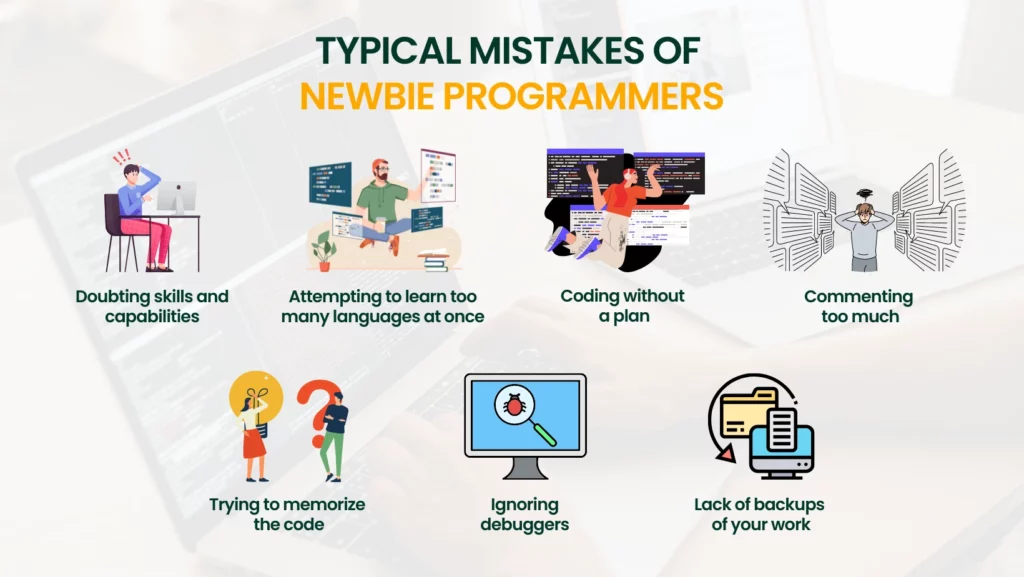Pretty much everyone makes mistakes when learning a new skill. There is no success without failure. There’s no progress without mistakes. It is especially true when it comes to programming. But while experienced coders treat mistakes as a part of day-to-day life, newbies might fixate on them and stave off learning further.
The great news is – you can learn from somebody else’s mistakes and make your progress faster and less painful. So let’s look into the most common mistakes of newbie programmers and advice on avoiding them.

Doubting your skills and capabilities
It’s in human nature to compare ourselves to others. But doubting yourself too much is not going to lead you to success. We are all different. Someone might grasp a difficult concept fast, while you need more time to understand it in full. At the same time, you might be able to write your first program faster than that other person. So instead of comparing yourself to more experienced coders, try to be inspired and motivated by their achievements. Be diligent and consistent in your studies and practice, and you will reach their level in no time.
How to avoid:
- Find a community to support you.
- Communicate with people of the same level as yours.
- Try not to compare yourself to coders with more experience.
Attempting to learn too many languages at once
Not sticking to one programming language is one of the biggest mistakes you can make when starting your coding journey. For example, if you study C++ for a week, then switch to Java because C++ is too hard, then decide Python suits you better, you will end up with a confused brain, a lot of wasted time, and no skills to show for it.
How to avoid:
- Commit to one language, learn it well, and only after that move to another one if you need to.
- Define your goal and learn the language to help you get to it. For example, if you want to be a front-end dev, start with HTML, then move to CSS, and then progress to JavaScript. If you dream of being a software developer, or are not yet sure what it is precisely you want to do, go for Java.
- Choose well-structured courses with a focus on practical experience. If you go for Java, CodeGym is a great resource. Start with learning Java syntax and move on to practical exercises. There’s plenty of them.
If you opt for Python or HTML, there are great courses for beginners at Educative.
Coding without a plan
Programming is not just writing lines and lines of code. It is logic-based creativity with a lot of research and meticulous planning involved. You will never write a good-quality program if you start writing without any research and thinking it through beforehand.
How to avoid:
- Divide the whole project into features with small, testable increments.
- Go with the flow in a sequence of Think, Research, Plan, Write, Validate, and Modify. Then, repeat the flow with each feature.
Commenting too much
Comments should be in the code to serve as reminders to your future self and as explanations for other programmers that might work on your project after you.
A lot of newbie coders make the mistake of commenting on obvious things. A massive portion of those comments is simply unnecessary and can be avoided with better names for your functions and arguments. Another typical mistake with comments – they describe why the code is used, not what the code is doing.
How to avoid:
- Use descriptive names for functions and arguments.
- Don’t put obvious comments.
Trying to memorize the code
Although some programming languages have English-like syntax, they are not natural languages. You can not learn phrases by heart and rely on them when writing code. In most practical cases, applying memorized code snippets will do nothing for you.
How to avoid:
- Focus on understanding the underlying concepts, data structures, and design patterns.
- Learn to apply those concepts to make the code work.
Ignoring debuggers
Debuggers not only help you get rid of bugs. Though being able to debug your code is a good skill overall. Using a debugger allows you to go through the code gradually and see the flow line by line. This is a great learning tool. You will get insights and a deeper understanding, which will help develop your problem-solving and reasoning abilities.
How to avoid:
- Use a debugger to understand exactly what your code is doing step by step.
Lack of backups of your work
Backing up practice code might seem unnecessary. But it forms a habit. And making regular backups is essential when you work on a real-life project.
Another mistake is storing your backups only locally. Imagine losing a month-worth work in a minute if your hard drive is destroyed for whatever accidental reason.
How to avoid:
- Choose a convenient backup tool and use it constantly.
- Some of the most popular version control tools are:
Final word
Don’t treat mistakes as something bad. Instead, treat them as learning tools, as an opportunity to grow. Now that you know some of the common mistakes of newbie programmers, you can avoid doing them yourself. And if you’ve already made some of them – great for you, now you can move on faster!
And remember – consistency is the key to success. So don’t lose motivation because of minor issues. Instead, stay focused on the goal and continue learning!
